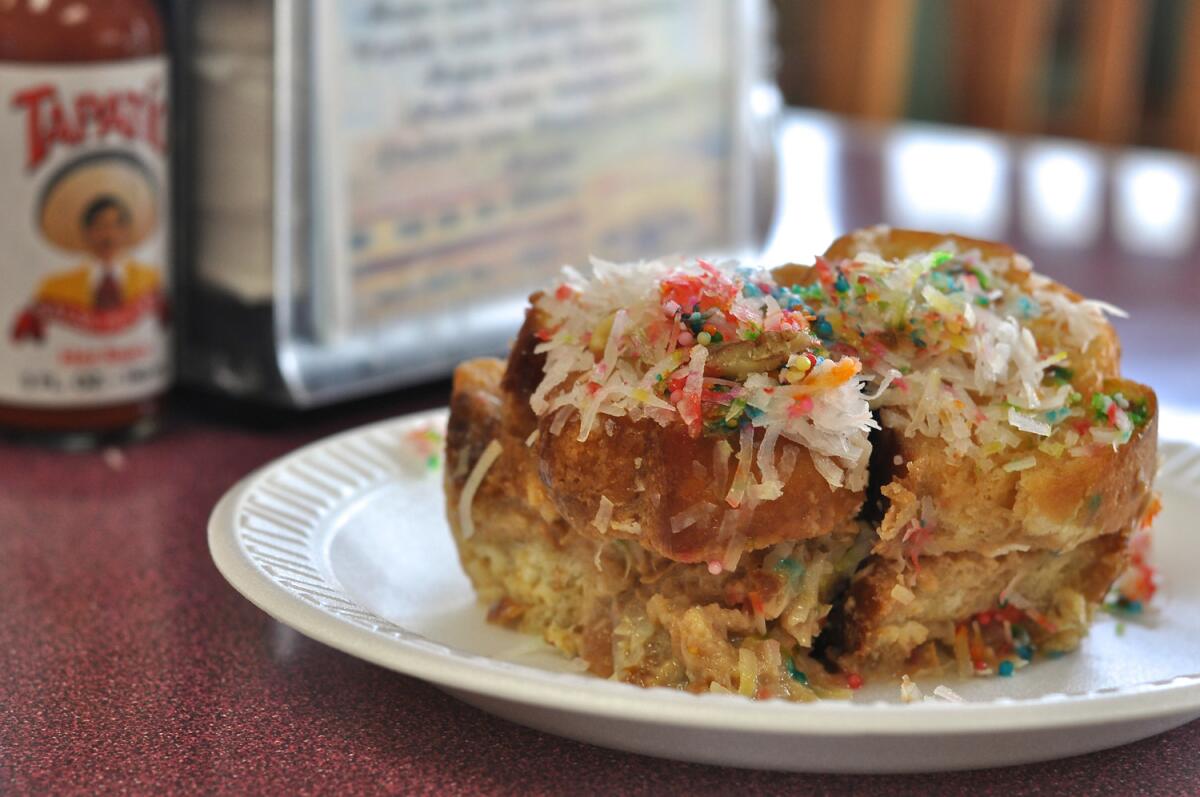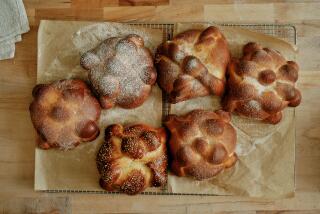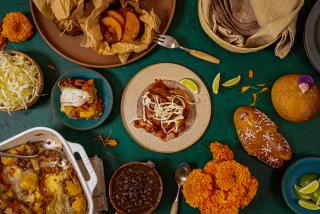A holiday Mexican bread pudding comes off the secret menu

One variation on the traditional Mexican bread pudding, at Tamales Lilianas in East Los Angeles.
The title of Arizona poet laureate Alberto Álvaro Ríos’ memoir is “Capirotada,” the name of the anything-goes bread pudding from Mexico that typically shows up on menus around Los Angeles during Lent. “Mexican cooking’s version of fruitcake” is how Ríos describes the dish adding that it’s made with “a zoo of foods.”
A classic capirotada — if such a thing even exists — is stale or toasted bread soaked in a syrup (often referred to as the “honey”) made of piloncillo (Mexican brown sugar), cinnamon, cloves and sometimes nutmeg, peppercorns, star anise or coriander. But the list of other ingredients that can show up in capirotada seemingly stretches to infinity.
There are recipes that call for eggs, walnuts, pecans or boiled peanuts. Other versions involve milk, fresh fruit, dried apricots, apple slices, raisins and prunes. In certain households in Guadalajara, capirotada wouldn’t taste right unless tomatoes were part of the mix.
One thing that’s generally agreed upon is that much of what goes into capirotada has religious significance — the bread symbolizes the body of Christ, the syrup is his blood, cloves represent the nails of the cross and so on. But there appears to be little consensus on what the dish is actually supposed to look like.
At Dos Arbolitos restaurant in North Hills, what emerges from the kitchen when you order capirotada is a layer of soft, sweet bread pudding so low and covered with melted white cheese that at first glance you’d think it was a plate of refried beans.
East Los Angeles’ Tamales Lilianas restaurant hews a little closer to what you’d expect from the dessert portion of the menu, its offering bedazzled with white flakes of coconut and lots of brightly colored sprinkles.
At chefs Ramiro Arvizu and Jaime Martin Del Campo’s La Casita Mexicana in Bell and at Mexicano, their newly opened sister restaurant in the Baldwin Hills Crenshaw Plaza, capirotada has been sort of a secret menu item.
“If you knew to order it, you could get it,” says Arvizu, adding that this year it will go public at both locations, available from this Thursday to Easter Sunday.
Arvizu, who is from Tecolotlán, a city in the central-western Mexican state of Jalisco, agrees that while it is perfectly acceptable to put “practically almost anything you want” in capirotada, their version, inspired by a family recipe, includes bread, raisins, peanuts, pecans, walnuts, Acitrón or candied cactus and a syrup made with milk, cinnamon sticks, cloves and piloncillo.
Of course, for those who grew up eating capirotada there’s a more ephemeral ingredient in every bite: nostalgia.
“It evokes the memories of our childhood in our country and our families,” says Arvizu, whose voice gets dreamy when describing the capirotada of boyhood.
“My grandmother would fry onions, then add tomatoes, then aged cotija cheese, then she’d layer it on bread that she’d lightly fry in oil or lard. Then she’d cover it with a wet cloth and cook it on the stove. It was salty and sweet, like a lasagna almost. And my mouth is watering just thinking about it.”
More to Read
Eat your way across L.A.
Get our weekly Tasting Notes newsletter for reviews, news and more.
You may occasionally receive promotional content from the Los Angeles Times.






